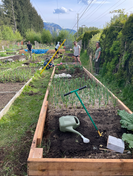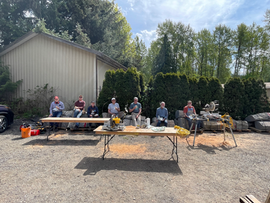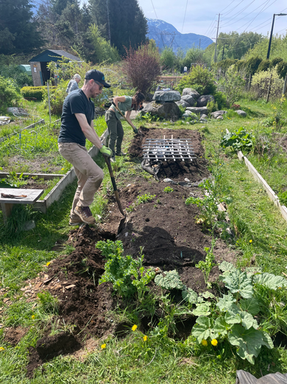
CAN GROW Community Gardens
Repair Work in Community Gardens: Maintaining Vital Green Spaces
Community gardens are valuable spaces that bring people together, provide fresh produce, and enhance urban environments. However, like any shared outdoor space, they require ongoing maintenance and occasional repairs to remain safe, functional, and inviting. In late 2024 we conducted multiple repair work initiatives at the Garibaldi garden site.
The repair work in our community gardens often includes fixing raised garden beds, repairing fences and gates, replacing broken tools and restoring pathways. Weather, frequent use, and natural wear and tear can cause damage that, if left unaddressed, may make the garden less accessible or productive.
Regular upkeep and repair work are essential for ensuring the garden remains a thriving space for all members. By investing time and effort into repairs, the community ensures that these green spaces continue to provide fresh food, education, and a place for social connection for years to come. We're grateful to the support from our board, local volunteers and the Squamish Men's shed for their support over multiple days.
Are you interested in volunteering in your local community? Visit the 'Join Our Team' page to learn how you can get involved pr pffer your services.
What are Community Gardens?
Community gardens help us connect to nature, create food security, meet new people, and get involved with growing our own food.
We hope to inspire the community with the potential of ‘urban farming’, as well as the importance of locally grown food for staying healthy and supporting sustainability.
Along with the edible benefits, we foster a nurturing and open community space. Our gardens are free of chemical pesticides and fertilizers, focused entirely on organic gardening practices.
We encourage our members to donate a portion of their abundant harvest to those in need through local community organizations.
Curious? Why not visit our gardens to see what is growing this season? You’ll find a variety of veggies and herbs as well as companion flowers.
Squamish CAN Grow manages three community gardens in Squamish:
-
Downtown Junior Gardens at Cleveland Ave. & Main St.
-
Bailey Street Community Gardens at Bailey Street (near Eaglewind pickleball courts)
-
Garibaldi Community Garden on Mamquam and HWY 99 (south of Canadian Tire)
Garden plots are adopted by gardeners on an annual basis, with renewal each new year. The yearly fees help cover the costs of managing the gardens, including administration, maintenance, and free educational workshops held throughout the year.
Apply for a Garden Plot
Applications are now closed until Fall 2025. Current gardeners are given priority, but a waiting list is available for new applications.
Got a question or a waitlist request?
To get added to the waitlist email our Executive Director, Krystle TenBrink at cangrowgarden@gmail.com. Please include your preferred location in the email.
What are Community Gardens?
Community gardens help us connect to nature, create food security, meet new people, and get involved with growing our own food.
We hope to inspire the community with the potential of ‘urban farming’, as well as the importance of locally grown food for staying healthy and supporting sustainability.
Along with the edible benefits, we foster a nurturing and open community space. Our gardens are free of chemical pesticides and fertilizers, focused entirely on organic gardening practices.
We encourage our members to donate a portion of their abundant harvest to those in need through local community organizations.
Curious? Why not visit our gardens to see what is growing this season? You’ll find a variety of veggies and herbs as well as companion flowers.
Squamish CAN Grow manages three community gardens in Squamish:
-
Downtown Junior Gardens at Cleveland Ave. & Main St.
-
Bailey Street Community Gardens at Bailey Street (near Eaglewind pickleball courts)
-
Garibaldi Community Garden on Mamquam and HWY 99 (south of Canadian Tire)
Garden plots are adopted by gardeners on an annual basis, with renewal each new year. The yearly fees help cover the costs of managing the gardens, including administration, maintenance, and free educational workshops held throughout the year.
Apply for a Garden Plot
-
Read the Community Garden Guidelines
-
Complete the application form and sign the code of conduct
-
Pay the plot fee
Applications are now closed until Fall 2025. Current gardeners are given priority, but a waiting list is available for new applications.
Got a question or a waitlist request?
To get added to the waitlist email our Executive Director, Krystle TenBrink at cangrowgarden@gmail.com. Please include your preferred location in the email.
Nina LaFlamme Photography
Getting Seeds: The Squamish Seed Library and Seedy Saturday
Annual Community Event Held in March (see Event Calendar for dates)
A fun, educational, and family-focused event held as the gardening season starts to kick off.
-
Get ready for spring by browsing the offerings from seed, and plant vendors from all over BC
-
Learn more about gardening with a full day of info-packed educational talks.
-
Grab or donate free seeds at the swap table
-
Sign up for the Seed Library (plus membership renewals)
Learn more about Seedy Saturday HERE!
The Seed Library launched on March 12, 2017. The Seed Library is hosted at the Squamish Library and helps support local gardeners by sharing vegetable, flower, and herb seeds.
It's simple to join! The annual membership is by suggestion donation of $5, which gives you access to the generously donated selection of seeds. A BIG THANKS to Salt Spring Seeds, West Coast Seeds, Dragonfly Seeds, and the Victoria Seed Library for our initial donations!
Do you need to return the seeds you 'borrow'? As long as you plant them, your membership has been a success! By planting your seeds, you are promoting food security, learning about gardening, and getting out in nature. But, we also encourage our members to donate unneeded seeds or seed-save to give back to the library. Not sure about how to save seeds? Why not attend one of our Gardening workshops this year? Learn more about our Seed Library HERE!
Gardening 101
We hope to make the CAN Grow Garden a supportive and educational space for new gardeners.
Here are some basic guidelines to help you get started on your gardening adventure!
Start with the Soil:
-
Before planting, ensure that the soil is well mixed and healthy.
-
Soil needs to be able to drain, so water does not ‘drown’ your plants, while simultaneously maintaining appropriate moisture for the plants. If it’s too ‘wet’, add some sand. If it’s too dry, add some compost and/or peat.
-
Soil amendments are used to enhance and maintain the health of the soil. Amendments include compost, organic fertilizer, manure, eggshells and seaweed. The timing of the application is key to its success. Know the amendment and the appropriate time and method to apply it to the garden. Cover crops can also be used during the off-season (or grown alongside you summer veggies!) to enrich the soil and reduce nutrient and soil loss.
-
A key indicator of soil health is the presence of worms. Worms are a fantastic attribute for mixing the soil and further decomposing nutrients.
What to plant?
As a beginning gardener, it is essential that you set yourself up for success.
-
Know what is best to plant from seed, and what is best to plant from starts or tubers.
-
Seed starts include: salad, kale, squash, cucumbers, peas, radish, beans, beets, carrots, spinach, parsnips, and Swiss chard
-
Plant starts include: broccoli, tomatoes, cabbage, fennel, leek, squash, cucumbers, bok choi, basil and parsley
-
Tuber starts include potatoes and sunchokes
-
-
Choose plants that grow well in this region. Our season is quite long but lacks the intense heat that allows certain plants to thrive. Melon, for example, will grow well, but maybe challenged ripening. On the other hand, kale can be planted throughout the season, and may even continue to grow through the winter.
-
Timing is everything. Spinach grows well in the early spring and fall but doesn’t like the hot summer. Use garden charts for guidance in planning and planting. Many plants, including lettuce and radish, require re-seeding throughout the season to allow for continuous harvest.
-
Plant starts on a cloudy day or later in the day so the intense sun doesn’t shock them.
-
Many plants, such as peppers and eggplant require great attention and are best grown in a greenhouse. Tomatoes grow well if started early and experience a hot and sunny season to ripen.
-
Plant ‘em right the first time
-
Give plants room to grow. Look on the package for distance recommendations.
-
Rule of thumb for seed planting depth: Plant a seed 3x deeper than the width of the seed. Cover with a loose layer of a healthy soil- no heavy lumps on top. Water immediately, and maintain moisture while seeds germinate.
-
Label plants and include the specific variety. This allows us to remember what grows well, and learn from the gardens around us.
-
-
Ideas for a delicious and successful garden include: Peas, kale, arugula, baby greens, zucchini and radish
Taking care of the plants:
-
Water them as needed. More thorough watering less often encourages healthy root development
-
Thin them to allow for root health
-
Keep weeds under control
-
Provide plant supports as needed
Observe your plants on a regular basis and pay close attention to their growth. They have much to offer — from tips to care for them, to a delicious meal!!
Where to Find Amendments in Squamish
-
Soil and Amendments
-
We buy our compost and soil from Net Zero Waste through Coast Aggregates. The garden blend is enriched with organic compost and is a great soil to start your gardens with. We use straight amender after the first year to boost the fertility of the garden.
-
-
Mulch
-
Straw can be difficult to find locally. Fallen leaves can be raked up in the fall and used as a wonderful free mulch. Grass clippings also work well (if no herbicides or pesticides are used on the grass)
-

Educators take an interdisciplinary approach with lots of hands-on learning opportunities for their students and community members.
To expand and encourage sustainable agriculture and food production in our region
The What, Why and Who within the Sea to Sky region.


















